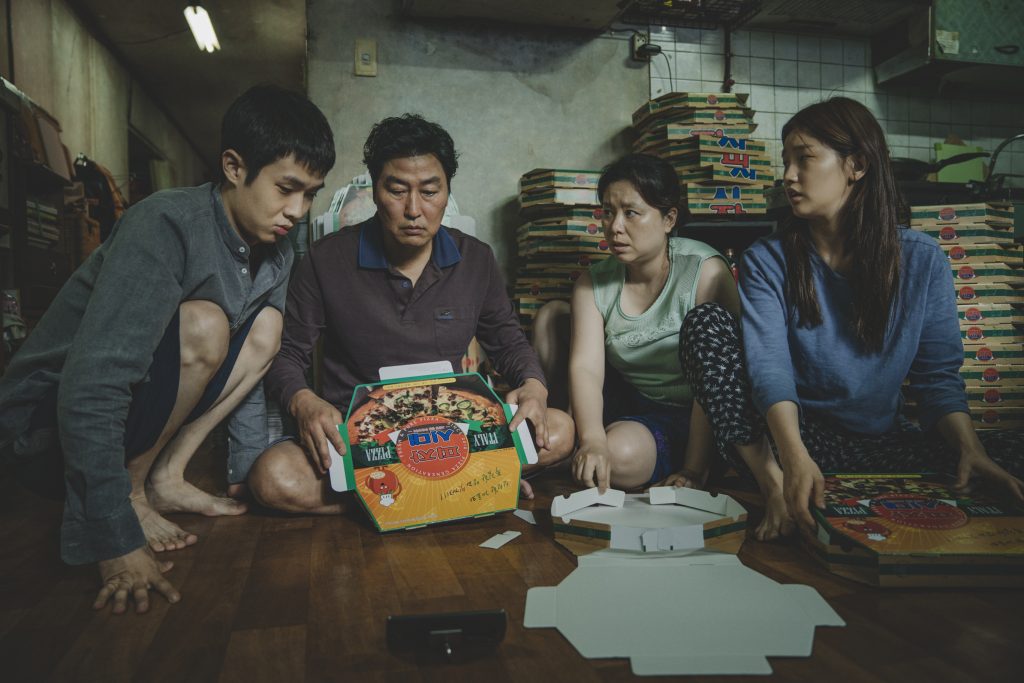By Sammie Purcell
BU News Service
BOSTON — With its quick rise in popularity and an undeniable showcase of mastery, Bong Joon-ho’s black comedy “Parasite” isn’t going unnoticed. Searingly shrewd and darkly funny, this wonderful film takes you on a wild ride that keeps you guessing until its final moments.
Directed by Bong Joon-ho (“The Host”), “Parasite” revolves around a lower-class family, the Kims, who live in a shabby semi-basement apartment in South Korea. The family, a lovable yet seedy crew of conmen, works odd jobs to make ends meet, but still struggles to get by.
The son, Ki-woo (Choi Woo-shik), secures a job as a tutor for the daughter of a rich family, the Parks. He convinces the Parks to hire his sister as an art tutor for their son, and slowly the rest of the Kims begin to infiltrate the home, with the mother becoming the housekeeper and the father the driver. The Kims pretend they are not a family so as to not raise suspicion about their intentions.
It would be wrong to give away more of the plot because watching this movie is a thrilling experience. The twists the story takes to get to its ending are surprising, to say the least.
It’s rare to see a film approach class conflict with nuance and care while simultaneously offering pure entertainment. Bong and the cast seamlessly integrate physical, almost slapstick comedy with crisp dialogue and poignant moments.
One scene, in particular, stands out, where the Kims get boisterously drunk at the Parks house one night. Their conversation switches from hilariously incoherent to profound to painfully self-pitying without missing a beat.
Everything in the film, from the framing of each shot to each line of dialogue, is used to great effect. Bong effortlessly combines humor, horror and thought-provoking ideas about the divide between the lower and upper classes so effortlessly that you may not catch everything upon first viewing.
Bong’s direction places the characters in specific settings meant to symbolize their stature – the Kims literally live halfway underground, while the Parks live in a sort of castle on a hill. The first time Ki-woo arrives at the Park’s home, he is dwarfed by the sheer size of it. Stairs are used to great effect, with the characters moving up and down as they move from affluence back to their sunken reality.

As the Kims work to mask themselves in lofty digs, swanky parties and the refinement of the upper class, the challenges they meet along the way serve as a constant reminder that no matter how hard they try they can’t change who they are. The Parks are kind, but they recognize the Kims are not of their ilk.
The Parks may be frivolous, willfully naïve and easy to make fun of, but they will always have the status the Kims can’t achieve no matter how well they masquerade. The con works on a surface level, but in scathing scenes, where the Parks casually remark on the “scent” of a person who rides the subway, or comment on Mr. Kim’s (Song Kang-ho) ability to adequately “toe the line” by not asking questions that are too personal, you begin to realize the only people the Kims are conning are themselves.
“Parasite” made history as the first Korean movie to win the Palme d’Or at Cannes back in May. If the Academy can recognize the genius behind the film, it would continue with its historic streak. No South Korean movie has ever been nominated for Best International Feature Film, much less Best Picture.
The film continues gaining ground with international audiences. Hundreds were turned away from sold-out showings at Toronto and Telluride festivals, and it made $376,000 in just three theaters during its opening weekend.
This is the type of movie that would reward repeat viewing – you may know what’s going to happen the second time around, but you’ll also know what to look for – whether its subtle lines that reveal the struggle of the lower class to better themselves, or the quiet, veiled scorn the upper class has for them.
The socio-economic divide between the Kims and the Parks is gaping. Bong leaves you with a tiny glimmer of hope, but also with the daunting question of whether that gap is surmountable or not.






[…] films, from “Crazy Rich Asians,” which followed the wealthy elite in Singapore, to South Korean four-time Oscar winner, “Parasite.” Sekeleona hopes the appetite for foreign films is still […]